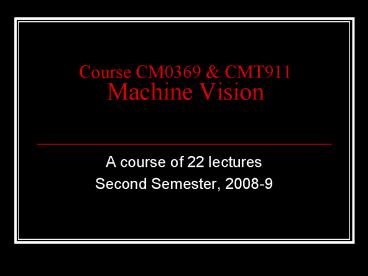Course CM0369 - PowerPoint PPT Presentation
1 / 42
Title:
Course CM0369
Description:
Course CM0369 & CMT911. Machine Vision. A course of 22 lectures ... Vision - Nautilus. Vision - Spiders. Impossible Scene. Machine Vision has difficulties ... – PowerPoint PPT presentation
Number of Views:37
Avg rating:3.0/5.0
Title: Course CM0369
1
Course CM0369 CMT911Machine Vision
- A course of 22 lectures
- Second Semester, 2008-9
2
Lecturer
- Prof. Bruce Batchelor, BSc, PhD, DSc, CEng, FIET,
FSPIE, FSME - Email bruce_at_cs.cf.ac.uk
3
Work Load
- 22 one-hour lectures
- 6 one-hour tutorials
- 2 one-hour laboratories (QT)
- About 40 hours of private study
- Course work Two 40min. tests (total 25)
- Examination (75, 2 hours)
- ge limit)
4
Mathematics for this course
- Low level (GCSE)
- Used for notation not for analysis
- BUT a mathematical mind is important
5
People are not reliable inspectors
6
People are not reliable inspectors(This is not
PC but reflects reality!)
7
Motivation foreign bodies in food
8
Machine Vision - definition
- Machine Vision is concerned with the engineering
of integrated mechanical-optical-electronic-softwa
re systems for examining natural objects and
materials, human artifacts and manufacturing
processes, in order to detect defects and improve
quality, operating efficiency and the safety of
both products and processes. It is also used to
control machines used in manufacturing. - ge limit)
9
Elements of a Vision System
10
Generic MV System
11
Inspecting objects on a conveyor
12
Network Machine Vision System
13
Network Vision System Controlling
Electro-mechical Hardware
14
Machine Vision is / is not
- Machine Vision is related to, but distinct from
- Computer Vision
- Image Processing
- Artificial Intelligence
- Pattern Recognition.
- ge limit)
15
MV Systems Engineering
- Mechanical handling?
- Lighting?
- Optics
- Sensors
- Electronics
- Signal processing
- Image processing
- Digital systems architecture
- Software
- Industrial engineering
- Human-computer interfacing
- Control systems
- Manufacturing, work practices and QA methods
- ge limit)
16
Priorities
- Speed (throughput latency)
- Cost (capital expenditure running costs)
- Reliability - must work in hostile environment
- Programmability
- Ease of use - naïve users
- Must work in hostile environment
- . but no need to work in ambient light!
- Simple is best
- ge limit)
17
Machine Vision - a bit of history
- 1954 J. K. Lemelson, patent on Machine Vision
- 1978 J. R. Parks, seminal article Industrial
Sensory Devices - 2005, Lemelson Foundation lost court case -
released the vision industry to develop the
technology without restriction. URL - http//bellsouthpwp.net/l/a/laurergj/UPC/ebmagar
t.html - http//www.law.com/jsp/article.jsp?id1126528524
211 - ge limit)
18
Machine Vision Market
- The market is divided into roughly three equal
parts - USA
- Japan
- Europe
- Together, they are valued at about 6000 million.
- URL
- http //www.bccresearch.com/pressroom/RIAS010B.ht
m
19
Market Size - now predicted
20
Information Sources
- B. G. Batchelor P. F. Whelan, Intelligent
Vision Systems for Industry, URL
http//www.eeng.dcu.ie/whelanp/ivsi/ - M. Graves B. G, Batchelor, "Machine Vision for
the Inspection of Natural Products", Springer
Verlag, January 2004, ISBN - B. G. Batchelor F. M. Waltz, Intelligent
Machine Vision Techniques, Implementation
Applications, Springer-Verlag, London, 2001,
ISBN 3-540-76224-8.
21
Information Sources Item 1 replaces courses
notes - other notes supplied as needed
- B. G. Batchelor P. F. Whelan, Intelligent
Vision Systems for Industry, Springer Verlag,
London Berlin, 1997, ISBN 3-540-19969 1. Now
available on-line at http//www.eeng.dcu.ie/whela
np/ivsi/ - B. G. Batchelor F. M. Waltz, Intelligent
Machine Vision Techniques, Implementation
Applications, Springer-Verlag, London, 2001,
ISBN 3-540-76224-8. - 3. B. G. Batchelor, Intelligent Image
Processing in Prolog, Springer-Verlag, Berlin,
1991, ISBN 0-540-19647-1. - 4. B. G. Batchelor, F. M. Waltz, Interactive
Image Processing, Springer Verlag, New York,
1993, ISBN 3-540-19814-8. - 5. B. G. Batchelor P. F. Whelan (editors),
Industrial Vision Systems, SPIE Milestone
Series, vol MS 97, pub. SPIE - The International
Society for Optical Engineering, Bellingham WA,
U.S.A., ISBN 0-8194-1580-4. - 6. M. Graves B. G, Batchelor, "Machine Vision
for the Inspection of Natural Products", Springer
Verlag, , Springer-Verlag, London, 2003, ISBN
1852335254
22
Image Acquisition
- Lighting and viewing
- Camera
- Array
- Line scan
- Range
- Non-visible imaging
- IR
- UV and fluorescence
- X-ray
23
Image Representation
- Array representation
- Grey scale
- Binary
- Colour
- Stereo
- image sequences
- Bandwidth of human eye, television and film
- Binary images, other representations
24
Image Processing for Machine Vision
- Grey-scale images
- Binary images
- Colour recognition
25
Image Analysis
- Measurement
- Position
- Orientation
- Size
- Angles
- Analysis
- Shape
- Texture
26
Software
- QT (home grown)
- Source code - requires MATLAB
- Stand-alone
- Stand-alone compiled
- Networked
- P-QT (home grown)
- PIP
- NeatVision
- NIH Image
27
Everybody (thinks he/she) is an expert on vision
- The human eye is not a camera
- The brain is not a computer
- A person does not see the world as a computer
does - Lay people do not think algorithmically, in terms
of what a computer can do easily - Introspection does not work! A system cannot be
designed properly by thinking about how a person
sees the world - ge limit)
28
Natural and Machine Vision
There are over 40 different types of eye - which
is best? Human vision is incredibly
complicated MV systems do not need to emulate
natural vision
29
Vision - Mammals Humans
30
Vision - Insects
31
Vision - Nautilus
32
Vision - Spiders
33
Impossible Scene
34
Machine Vision has difficulties
35
Redesign the product to avoid difficulties with
inspection
36
Visual sensing
37
Non-visual sensing (line-scan)
38
Non-visual sensing (range map)
39
Non-visual sensing (UV)
40
Non-visual sensing (IR)
41
Non-visual sensing (Thermal IR)
42
Non-visual sensing (X-ray)































